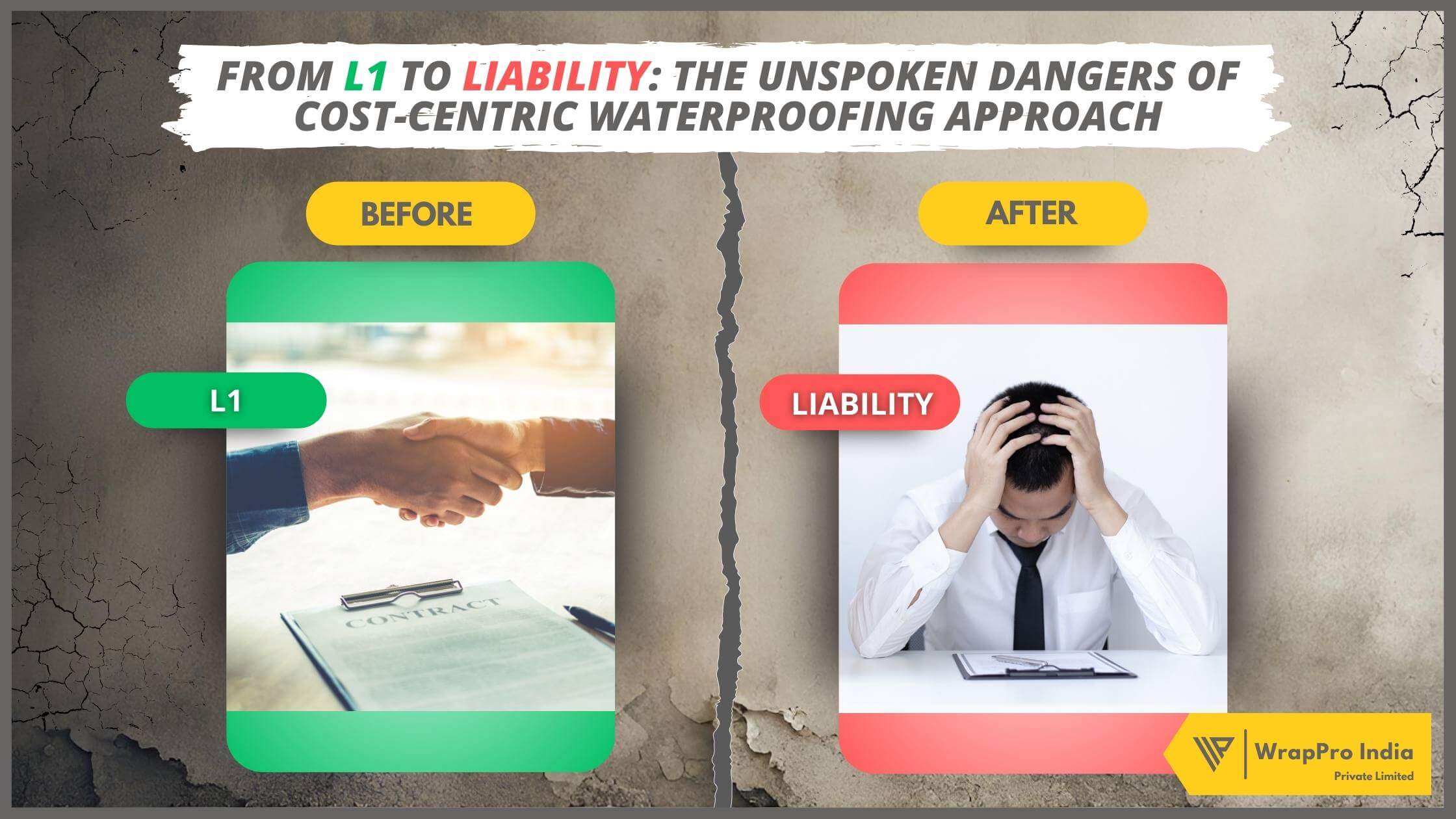
From L1 to Liability: The Unspoken Dangers of Cost-Centric Waterproofing Approach
The construction industry has made significant strides, especially in prioritizing the waterproofing of structures by incorporating high-specification construction chemicals and meticulous vendor selection processes to ensure the highest standards are met. Yet, despite these forward-thinking measures, the age-old tendency to opt for the lowest bidder—commonly referred to as the L1 approach—persists, often compromising long-term project quality and overall value.
This comprehensive discussion seeks to highlight why a more nuanced, value-oriented approach should be the standard for selecting waterproofing contractors.
The Inherent Risks of the L1 Approach: A Rational Analysis
1) Undermining Ethical and Quality Benchmarks
Opting for the lowest bid sets a precedent that shifts the industry focus from excellence to price competitiveness. Over time, this can erode not only the quality but also the ethical standards, making it a race to the bottom rather than a pursuit of excellence.
2) Hidden Financial Risks
Low bids often appear budget-friendly, but they can be deceptive. Tight budgets may not account for unexpected issues, creating a situation where initial savings turn into unforeseen expenses, offsetting any initial financial gains.
3) Limitation on Technological Advancements
The constraints of an L1 mindset actively discourage investments in new technologies that could elevate the project. This can keep the industry stagnant, missing out on innovations that could lead to better efficiency and longevity.
4) Marginalization of Professional Expertise
When price becomes the predominant evaluation criterion, it devalues the multidimensional expertise that seasoned contractors bring to the table. In this scenario, the wealth of experience and specialized skills that could elevate the project’s quality is overshadowed by the allure of lower costs.
5) Mismanagement of Project Risks
Low-cost bids often lack robust risk assessments or contingency planning. The lack of preparation can lead to delays, extra costs, and strained relationships among stakeholders when things don’t go as planned.
6) Variability in Project Quality
Reduced budgets compel unethical contractors to make compromises, leading to inconsistent quality within the same project. This not only puts the overall structural integrity at risk but also could result in higher maintenance costs over time.
By addressing these concerns in a straightforward and comprehensive manner, the aim is to shift the focus from simply minimizing costs to optimizing value.
Let us now delve into why a contractor should be viewed as a strategic partner rather than a mere service provider.
Elevating the Client – Vendor Relationship:
Engaging a contractor shouldn’t be viewed as a mere transaction; it’s an opportunity to initiate a strategic partnership for long-term value and success. Selecting contractors with a proven track record of quality and reliability yields multiple benefits that transcend mere execution:
1) Value-Driven Consultation:
Highly qualified contractors bring more to the table than just labor and materials; they offer consultative insights that can streamline processes and optimize costs without sacrificing quality.
2) Pioneering Innovations:
Contractors at the forefront of industry developments have the ability to offer innovative solutions. This not only adds value to the project but also positions it at the cutting edge of technology and sustainability, giving your investment a future-ready appeal.
3) Lifelong Commitment to Excellence:
A strategic partnership with a dedicated contractor offers more than a one-time service. They offer a continuous engagement that involves regular maintenance, upgrades, and the ability to adapt to new challenges, thus enhancing your project’s lifespan and operational efficiency.
In Conclusion: Rethinking the L1 Paradigm
The traditional mindset that champions the lowest bidder may yield immediate cost savings, but it does so at the cost of long-term value, project integrity, and reputation. The key to a successful, enduring project is a multi-faceted evaluation that goes beyond price to consider quality, innovation, and a lasting partnership.
The quest for quality should not be mistaken for an unnecessary expense; it’s an investment that pays dividends in terms of reliability, reputation, and resilience. We must transcend the antiquated limitations of lowest-cost thinking and welcome a new era that prioritizes a brighter, quality-centric future for our esteemed projects.
By nurturing a strategic partnership with your chosen contractor, you make an informed decision that stands the test of time. Quality, in this context, isn’t just a project criterion; it’s a long-term commitment to excellence.
“In a world focused on the immediate gains, it’s the long-term value that truly stands the test of time. Choose wisely.”

